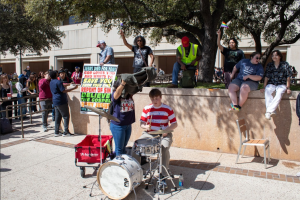The justice system continues to fail
November 8, 2022
On Feb. 25, 2000, Adnan Musad Syed was convicted of first-degree murder, kidnapping and false imprisonment of his ex-girlfriend, Hae Min Lee. In June of that year, the then 17-year-old was sentenced to life plus 30 years in prison.
Syed and Lee started dating during their junior year; however, their relationship had to be kept secret from their families because Syed’s strict immigrant parents were culturally conservative and against dating. Lee had broken up with Syed before the winter break of their senior year in December 1998 and went missing after school on Jan. 13, 1999. Syed — an honor roll student, track and football athlete and homecoming prince — was arrested on Feb. 28, 1999, for the murder of Lee.
The prosecution painted a picture of a young Muslim boy who put his family and relationships at the mosque on the line for his girlfriend, leaving him with nothing when she broke up with him eight months later. They told the jury to look at what a duplicitous liar he is; he played the good Muslim kid at home and at the mosque, but he ran around drinking, smoking and having intimate relationships with many girls — though any child of immigrant parents will have many of their own stories about the double lives they have led. The state’s case rested on the statement of their star witness, Jay Wilds, who claims Syed had told him he was going to kill Lee and later enlisted his help in burying the body. They corroborated Wilds’ story with cell phone records that put Syed exactly where Wilds said they were that day on Jan. 13.
However, Syed and his family were adamant about his innocence. The older sister of Syed’s best friend, immigration lawyer Rabia Chaudry, was never satisfied with the trial’s results. Chaudry reached out to a former writer for the Baltimore Sun, Sarah Koenig, asking her to look deeper into the case, which would result in one of the earliest true crime podcasts, “Serial.” The podcast would go on to be downloaded over 100 million times in its first year of release, bringing widespread public attention to the case and winning just about every major journalistic award, including a Peabody — making “Serial” the first ever podcast to receive one. Koenig spent a year investigating Syed’s case before the podcast’s release in 2014, uncovering information about a potential alibi who was not contacted by Syed’s defense attorney, the credibility of the cell tower records, and untested DNA evidence. The release of a documentary series in 2019 on HBO Max, “The Case Against Adnan Syed,” also shed light on other evidence, such as the discovery of Lee’s car and the lividity of the body. Not to mention the complete lack of physical evidence linking Syed to the crime— no DNA matches, no clothing fibers, no matching soil on his shoes — and the many inconsistencies within Wilds’ multiple statements and testimonies. The location where Syed showed him the body varied from outside a pool hall, to a Best Buy parking lot, to outside his grandmother’s house. Additionally, how the police brought Wilds in for a second statement after his first did not match the cell records, but after a three-hour-long, unrecorded pre-interview, Wilds’ story somehow came to fit the cell records better.
Last year the Juvenile Restoration Act took effect in Maryland, which states that if you have served over 20 years in prison for a crime you committed as a juvenile, you can ask the court to reduce your sentence. On Oct. 2, 2021 — the day after the law was enacted — Syed’s lawyer delivered his case to the Baltimore City State Attorney’s office for them to review. As a result, there was a reinvestigation. Notes regarding two potential alternate suspects in the prosecution’s old files were found, about which the defense team had not known — a Brady violation — causing the state to write a motion to vacate Syed’s conviction. The state also no longer has confidence in Wilds’ testimony and the cell records, as multiple experts have declared the incoming calls are insufficient evidence to identify exact locations and corroborate Wilds’ narrative. If that was not enough, one of the lead detectives on Syed’s case, William Ritz, has been accused of misconduct in another case that went to trial the same year as Syed’s. He supposedly manipulated and fabricated evidence, did not follow up on other suspects and did not disclose information to the defense.
The Baltimore prosecutors dropped all charges against Syed on Oct. 11, 2022. After spending over half his life in prison, Syed is now free. Unfortunately, I could not include all the curious details of the case that make Syed’s former conviction so confusing, so I recommend you listen to the “Serial” podcast or watch the HBO series to determine whether or not you believe justice has been served.







John W. • Nov 9, 2022 at 12:50 pm
What an interesting article! Very well written and informative, great contribution to the Paisano!